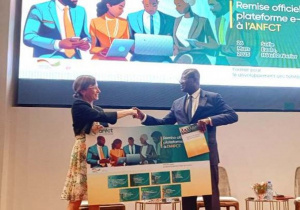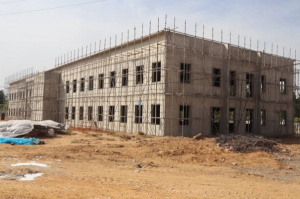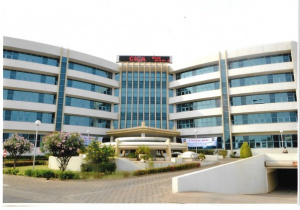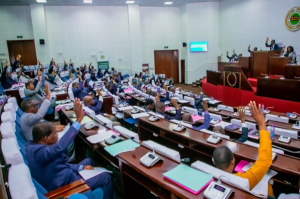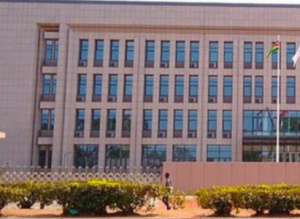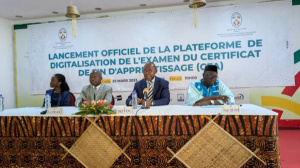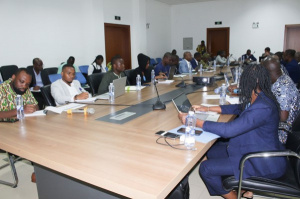Togo First
Togo Launches E-Learning Platform for Local Officials
Togo has launched an e-learning platform to train local elected officials and authority staff. Developed by the National Training Agency for Local Authorities (ANFCT), the platform debuted on March 26, 2025, in Lomé.
Accessible at dev.anfct.gouv.tg, the platform offers seven training modules on local finance management, development planning, and financial resource mobilization. The platform provides flexible, interactive access to content that addresses decentralization challenges.
By using this system, the ANFCT is not only innovating education but also saving the state budget: they estimate that it could save over CFAF 3 billion annually. Denyo Komi Dodzi, Managing Director of ANFCT, believes this platform represents a winning economic and educational model.
With over 1,700 local councillors needing training for upcoming municipal elections, this initiative is timely. The German Development Cooperation (GIZ) supported the platform's development as part of the Decentralisation and Governance Programme (ProDeG IV).
Ayi Renaud Dossavi
University of Kara: New Campus Almost Done
Construction of the new University of Kara (UK) campus in Togo is nearing completion, with over 90% of the shell finished, according to Higher Education Minister Kanka-Malik Natchaba, who visited the site earlier this week.
Launched in April 2023 by President Faure Gnassingbé during a groundbreaking ceremony, the project has progressed steadily over two years. Located in Pya, 12 kilometers north of Kara, the 250,000 m² campus is designed to meet international standards for public universities.
The campus will feature classrooms, laboratories, libraries, student residences, dining areas, and sports and cultural facilities. It aims to create a modern academic environment and improve learning conditions. With a capacity of 30,000 students—up from 20,000 at the current site—the campus will address growing demand for higher education in Togo.
This initiative aligns with a broader national policy to strengthen higher education and research. “The aim is to establish and promote a center of higher education and research in each region of the country,” officials stated.
Esaïe Edoh
Togo: CICA-RE Achieves Record Turnover of CFA117 Billion in 2023
The Joint Reinsurance Company of the Member States of the Inter-African Conference on Insurance Markets (CICA-RE), based in Lomé, posted a turnover of CFA117 billion for the 2023 financial year, up about 10% from CFA106 billion in 2022. The company exceeded its Board of Directors’ target of CFA110 billion. CICA-RE also reported a net profit of CFA10 billion, maintaining steady growth.
Between 2020 and 2023, CICA-RE’s turnover rose consistently: CFA87 billion in 2020, CFA96 billion in 2021, and CFA106 billion in 2022. Annual growth rates for 2021 and 2022 stood at 10.3% and 10.4%, respectively.
Growth drivers
Turnover growth in 2023 was mainly driven by subscriptions to Life and Non-Life treaties, which contributed CFA16.7 billion. Regional offices also contributed with notable production gains.
Moreover, output at the Central Africa branch soared 24.35% over the year reviewed. It generated CFA17.1 billion in 2023, representing 15.07% of total sales. The year before, the Central African branch had a turnover of CFA14.2 billion in 2022. In West Africa, turnover stood at CFA36.4 billion in 2023, up 11% from CFA32.8 billion the previous year, representing 30.99% of turnover. North Africa added CFA6.6 billion, a 14.28% increase from CFA5.8 billion in 2022, contributing 5.65% to the company’s activities.
Established in 1987 under the Inter-African Conference on Insurance Markets (CIMA), CICA-RE is a reinsurer for insurance firms. Based in Lomé, Togo, it unites member countries from West and Central Africa such as Benin, Burkina Faso, Cameroon, Central African Republic, Congo, Côte d’Ivoire, Gabon, Mali, Niger, Senegal, Chad, and Togo.
This article was initially published in French by Esaïe Edoh
Edited in English by Ange Jason Quenum
Togo Parliament Approves OTR Reform to Reshape Tax Governance
The Togolese Parliament approved a major reform of the Togolese Revenue Office (OTR) on March 25, 2025. The Ministry of Economy and Finance introduced the new law, which redefines the OTR’s institutional structure by abolishing the supervisory board, reducing the number of directors, simplifying manager appointment procedures, and strengthening oversight by supervisory ministries.
The reform expands the OTR’s mandate to improve revenue mobilization and streamline tax management. It emphasizes economies of scale and tighter controls through the Inspectorate General of State and the Inspectorate General of Finance.
The government announced this reform months earlier by adopting a bill to initiate these changes. Parliament also passed a second text revising the legal framework for public companies, replacing a 35-year-old law. This update aligns with OHADA benchmarks and aims to enhance the economic and managerial performance of public entities.
Ayi Renaud Dossavi
BOAD Grants Togo CFA20 Billion for Ministerial Complex in Lomé
Togo secured CFA20 billion from the West African Development Bank (BOAD) to build and run the Lomé ministerial complex. Société de Construction de la Cité Ministérielle (SOCOCIM SAU) will lead this project.
The complex will include 18 administrative buildings, consisting of 8 towers ranging from R+8 to R+13 and 10 R+2 buildings. This initiative aims to modernize Togo's administrative system by consolidating ministerial departments into one location in Lomé.
BOAD projects that the construction phase will create over 1,000 jobs and generate an indirect added value of CFA11.6 billion annually. The complex will span 90,000 m² in Bè-Klévé, Golfe 3 commune, and feature offices, housing, shops, hotels, leisure areas, green spaces, and cultural zones.
The project has been in the pipeline for years, with preparations started in September 2022 and initial discussions in 2021.
Ayi Renaud Dossavi
BOAD Provides CFA40 Billion to Togo for Energy Emergency Relief
Togo secured CFA40 billion from the West African Development Bank (BOAD) to address urgent energy sector needs, including unpaid electricity bills. BOAD announced this financing during its 145th Board of Directors meeting held on March 26, 2025, in Lomé.
This funding aims to ensure the continuity of public electricity services amid regional supply disruptions, particularly from Nigeria. Compagnie Énergie Électrique du Togo (CEET), Togo’s power utility, has struggled with financial difficulties for years. In 2020, BOAD provided CFA25 billion to CEET for similar purposes.
The Togolese government has implemented structural reforms within CEET to restore financial stability, improve governance, and achieve universal electricity coverage by 2030. By 2022, CEET relied on imported electricity for 52.27% of its supply, mainly from Ghana and Nigeria, while local sources like ContourGlobal, Kekeli Efficient Power, AMEA Solar, and Nangbéto contributed 47.73%.
This article was initially written in French by Ayi Renaud Dossavi
Edited in English by Ange Jason Quenum
Togo Trains Researchers in Satellite Data Analysis with MOSAIKS
Last week, over 100 students, researchers, and teachers in Lomé learned to use MOSAIKS, a cutting-edge spatial data analysis tool developed by UC Berkeley and UC Santa Barbara. Togo Data Lab organized the workshop on March 22, with support from ProDigiT (GIZ Togo), aiming to democratize artificial intelligence applied to satellite imagery.
MOSAIKS transforms satellite images into actionable indicators that users can process on a laptop without advanced image processing skills. Participants explored practical applications in agriculture, geography, and environmental monitoring during case studies.
Komlan Agbo, a geography doctoral student, said, “This tool opens up unprecedented prospects for applied development research.” Togo Data Lab plans to expand training access and strengthen technical support for local researchers. The ultimate goal is to equip Togolese human capital for smarter decision-making based on reliable data.
This article was initially written in French by Ayi Renaud Dossavi
Edited in English by Ola Schad Akinocho
Education: Togo Modernizes Apprenticeship Certification Process
Togo has digitized the registration process for the Certificate of Completion of Apprenticeship (CFA) exam and diploma issuance. Citizens can now access these services on the government portal, service-public.gouv.tg. Minister Isaac Tchiakpé officially launched the initiative in Lomé on March 25, 2025.
The Ministry of Trade, Crafts and Local Consumption teamed up with the Ministry of Technical Education, Vocational Training, and Apprenticeships to create this platform, with technical support from Agence Togo Digital (ATD). The move responds to artisans’ demands for faster and simpler procedures.
The new digital system aims to streamline administrative tasks and speed up diploma delivery. The Department of Examinations, Competitive Examinations, and Certification (DECC) will now issue diplomas within six months after results are announced, cutting waiting times for candidates.
Minister Tchiakpé emphasized the government’s commitment to modernizing public services, saying: “This platform aligns with our roadmap and the Head of State’s vision to make digitalization central to Togo’s development strategy. It improves access to services and simplifies citizens’ lives.”
The Togolese government plans to digitize 75% of administrative processes by the end of 2025.
This article was initially published in French by Esaïe Edoh
Edited in English by Ange Jason Quenum
Lire aussi:
IFAD Reviews ProMIFA Progress in Togo
An International Fund for Agricultural Development (IFAD) delegation visited Lomé from March 17 to 21. They came to assess advancements on the ProMIFA, Project to the Incentive Mechanism for Agricultural Financing based on Risk Sharing (ProMIFA). The visit addressed recommendations from the July 2024 supervision mission.
Xavier Desmoulins led the delegation, discussing the project's recovery and improvement plan with Togolese authorities. Discussions highlighted obstacles and produced recommendations for better efficiency. The mission reviewed ProMIFA's 2025 Annual Work Plan and Budget.
Launched in February 2020, the ProMIFA helps smallholders and agricultural enterprises access financial services. It aims to help them grow and enter markets. IFAD supports the project, using a risk-sharing approach to boost agricultural financing. This approach is considered key for growth and poverty reduction in Togo.
Esaïe Edoh
Bird Flu: Togo Fights Back
Togo has recently confirmed H5N1 bird flu cases on three poultry farms in Adjengré, Anyron Kopé, and Kouloumde. The government responded with emergency measures to stop the virus and reduce economic damage.
Around 6,500 birds were affected across a modern farm in Adjengré and a traditional farm in Kouloumde. General Yark Damehame, Minister for Animal Resources, ordered the culling of infected birds, disinfection of farms, a ban on poultry movement, and the closure of markets and feed mills in affected areas for one month.
The government promised compensation for breeders based on current rates to help them recover and sustain the poultry industry. The Ministry urged breeders and traders to follow these rules strictly. Officials emphasized that vigilance is critical to protect public health and ensure the long-term survival of Togo’s poultry sector.
This article was initially published in French by Ayi Renaud Dossavi
Edited in English byOla Schad Akinocho

